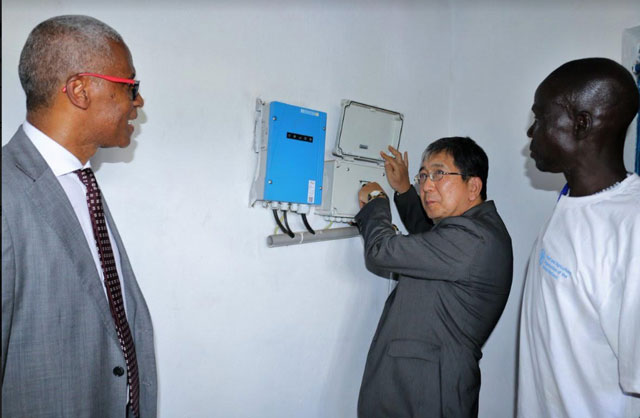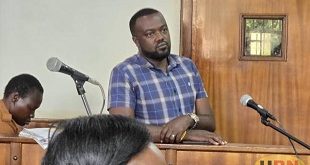
Kameda launch solar-powered irrigation scheme in Moyo on March 26, 2019. The Japan government
supported establishment of two schemes in Moyo and Yumbe districts, for year-round cultivation of
high value crops. Courtesy Photo.
Moyo, Uganda | ISAAC KHISA | It is 1pm. Dressed in UN Food and Agriculture Organization (FAO) white T-shirts, men and women sing songs of praise as a convoy of vehicles snake its way in Palorinya East Village in Moyo District.
The delegation consists of FAO representative to Uganda Antonio Guerido, the Japanese Ambassador to Uganda, Kazuaki Kameda, representatives from the refugee agency UNHCR and officials from government.
The purpose of the long winding trip, 151 kilometres northwest of Kampala, was to witness the progress made in the US$500, 0000 project of strengthening resilience of refugees and the host communities to absorb, recover and adapt sustainably to shocks.
Launched last year with funding from the Japanese government and implemented by FAO, the project encompasses a sprinkle irrigation system, vegetable growing, poultry and training in farming skills.
The project that was built on the findings and recommendations from the Resilient Index Measurement and Analysis report from Northern Uganda, extended the same services to Bidi Bidi refugee camp, which is located a few kilometres from Palorinya refugee camp.
Ali Lou Abraham, the chairperson of Robijame Vegetable Growers that has 59 members said the irrigation system has boosted their incomes and food security.
“In the beginning of the year, we were able to sell cowpea and got Shs3.5million,” he said on March 26, adding that the residents have diversified on food crops with the growing of various cabbages.
Statistics from FAO show that more than 1,500 households benefited from the project, far higher than the planned target of 900 households in Moyo and Yumbe Districts.
Antonio Querido, the FAO Representative to Uganda said there is need to understand the challenges that farmers face in order to address the constraints that undermine sustainable livelihood and self-reliance.
“It is therefore prudent to understand that as refugees settle, refugees and host communities need to be engaged in market oriented agriculture production, together with private sector, along the value chains,” he said.
“We need to work with the government and development partners toward building the capacity of on farm and off-farm agribusinesses through the development of business skills and strategies with a special focus on youth and other extremely populations,” Querido remarked.
He said FAO believes that sustainable livelihood options can be built by aligning its efforts to national and district development plans and natural resource management plans and building on the transparent land tenure practices.
On the other hand, Kameda the Japanese envoy said he is proud of the progress registered with regard to improving the resilience of refugees and the host communities.
“I am honestly impressed to witness the remarkable achievements with extensive vegetable field in this arid area. I believe this achievement could be attributable to both the diligent work by FAOs staff and the self-help effort by the refugees and host communities,” he said.
He said due to the refugee influx, livelihood support becomes much more crucial in order to establish self-reliance.
Kameda said that although Japan’s allocation towards livelihood support stood at only 11% of the total budget for refugee issues, it is expected to increase this year.
Uganda hosts more than 1.2 million refugees as a result of the government’s open door policy with majority based in the West Nile region.
 The Independent Uganda: You get the Truth we Pay the Price
The Independent Uganda: You get the Truth we Pay the Price



